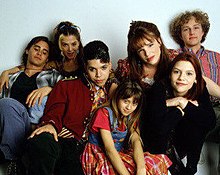Claire Danes and Jared Leto debuted their careers in 1994 with a drama about high school girl Angela Chase, which explored puberty like never before on TV

One of autumn’s most anticipated films is the two-part film adaptation of Gregory Maguire’s Wizard of Oz prequel Wicked. Wicked is a sweet and nuanced story of an odd relationship between two young witches, despite its stage show glamour.
Winnie Holzman, who wrote the musical with composer and lyricist Stephen Schwartz, was familiar with this. Holzman crafted another famous image of female adolescence, one of the 1990s’ most renowned and enduring teen dramas, before Wicked went viral.
Despite only 19 episodes in 1994-95, My So-Called Life had a big impact. It made Claire Danes and Jared Leto famous and inspired a generation of young females to dye their hair red.
The sitcom centered on 15-year-old high school girl Angela Chase in a fictional Pittsburgh suburb. Smart, awkward, and sometimes annoyingly self-absorbed, Angela was a typical teenager trying to figure out who she was. Her world felt completely different from the sparkling youths of Beverly Hills 90210 or the more grounded British school drama Grange Hill, and was written with great authenticity.
Maybe our misogynistic culture made me think a narrative about a teenage girl wasn’t “enough”
Theater-trained Holzman. She wrote numerous plays after studying Musical Theatre Writing at New York University after graduating from Princeton. (The McCarter Theater in Princeton revived her 2015 play Choice.) Staff writer for Thirtysomething, the pioneering 1980s ABC sitcom about Philadelphia baby boomers co-created by Marshall Herskovitz and Ed Zwick, she refined her craft. Holzman joined the show midway through its four-season run since it was her favorite, “so it was my dream job,” she told the BBC. This was my training ground. Like film school, but paid!” Herskovitz and Zwick approached Holzman with a new ABC project she would conceive and they would executive produce after learning the show was ending.
Culture Changers
Culture Shifters interviews famous artists about their world-changing work. Read more series articles here.
Herskovitz and Zwick started on ABC’s Family but always believed the teenage daughter was neglected. She was forbidden from doing anything subversive, rebellious, or teen-like. It made them want a real teen on screen.” Holzman, 39, with a small daughter, wasn’t sure the project was for her. “Teens weren’t on my radar,” she explains. She recalls driving home after a conference “saying to myself, well, that’s an okay subject until we get a real idea.” She pondered if a teenage girl’s life could support a show. “Maybe there was a part of me so inculcated in our misogynistic culture that was feeling like ‘that’s not enough’,” she adds.
However, Zwick and Herskovitz believed she was qualified. “Sometimes people see things in you that you don’t even see yet in yourself,” adds. “Because I loved the topic. I don’t think I would have thought of that on my own.”
The ABC sitcom My So-Called Life premiered on August 25, 1994, revealing its greatness. Angela’s voiceover immerses the viewer from the start. Holzman claims the show treated her “as seriously as any adult character by giving her respect and depth and really exploring her in every way”.
Angela dyes her hair fire engine red, much to her parents’ dismay, and is chastised in English class for thinking Anne Frank might not have had it so terrible, being pent up in an attic with a boy she liked. “Like many adolescents, she – and the series – can be off-putting at first, but it doesn’t take long to develop a deep attachment to her,” Variety noted, calling the show “a critical hit and has the makings of a ratings contender”.
At the show’s start, Angela is avoiding her childhood friend Sharon and hanging out with Rayanne (AJ Langer), “who was dangerous and edgy and not quite trustworthy, but at the same time, a lot of fun,” and Rickie (Wilson Cruz), who was discovering his sexuality. Teen friendship was intense and complex in the program. “Who you align yourself with in high school is a lot of what your identity is,” he explains. “That sounds kind of obvious, but I wasn’t sure it had ever been depicted on TV.”
The series focused on Angela’s tentative connection with Leto’s monosyllabic Jordan Catalano, with his piercing eyes and curtain haircut, who gets his attractiveness by slouching moodily against his locker. (“I like how he’s always leaning,” Angela sighed.) Meanwhile, she is unaware that her friend Brian (Devon Gummersall) likes her.
Winnie Holzman’s five cultural changers

Thornton Wilder, Our Town (1938). The smooth, seemingly natural manner Wilder carries us through waking life into the metaphysical was pioneering then and remains still.
Streisand, The Way We Were (1973) Since no Jewish lady had played a Jewish romantic lead before, I could say Barbra in this gorgeous picture. Streisand redefined beauty and possibility.
Stephen Schwartz, John-Michael Tebelak, Godspell (1970). The original Off Broadway production was electric, blending irreverence and devotion with abandon. Others have always tried to copy it.
Joni Mitchell, Blue (1971). This remarkable combination of tunes impacted our lives and self-image. We felt seen and heard as she got more personal. Without Joni Mitchell, Taylor is nothing.
Paul Simon—Graceland (1986). Genre blending! This CD defines freedom and the power of music and collaboration. It debuted in autumn 1985, two months after my daughter’s birth. Songs refresh and cleanse your soul.
Danes’ assuredness in the part is key to the show’s success. Holzman worried they wouldn’t find the perfect showgirl. Linda Lowy, who casts many Shonda Rhimes episodes, was chosen. “She said there’s this girl in New York you need to see.” Danes was 13, but Lowy was accurate about Angela being 15. “We never looked at anybody else after we met Claire,” he recalls. Danes told Variety’s Cruz in 2019 that Angela’s insecurity resembled her own. “I hurt so badly. Probably never felt more pain. That’s a tough age for girls. I just finished junior high. I felt battered during those social gymnastics. My performance was terrible.” She admired Holzman’s writing: “She said everything I wanted in my heart but couldn’t articulate.”
Also important was Rickie’s casting. Holzman envisioned an androgynous, half-Latino, half-black character. Cruz was perfect for the role when found. “Not to sound too much like I live in California, but I do think he was fated to play that part,” she says. “There was just a rightness to him.”
Holzman’s childhood theatre experience influenced the character. She had met many homosexual guys while doing summer seasons, so she included a gay character in Angela’s social group, even though “he wasn’t even self-identifying as gay yet” at the start of the series. She believes all the characters “were in a state of flux, trying to understand who they were – and that even applied to the grown-ups”.
At the time, LGBT characters on TV were rare; Thirtysomething lost advertisers due to them. Rickie’s sexuality is subtly incorporated throughout the plot. He applies eyeliner in the girls’ restroom first. Later in the run, he’s secure enough to dance at the school dance with new student Delia, who is his date. In the last episode, he comes out to Delia as gay.
It was the first time many young people saw themselves on film. Holzman says it sparked sexuality discussions for some and led to coming out for others. Sometimes “just watching it alone was empowering for them,” she says. “That makes me feel very, very happy.”
They had limited use of Danes due to her age. “I was so in awe of Claire, that I would have put her in every scene, but this ended up being a very creatively stimulating problem to have,” he adds. It forced her to give other characters more space, which led to interesting developments like Sharon and Rayanne’s growing friendship (Rayanne, the bubbly Langer, who married a British aristocrat and became the Countess of Devon) or Brian and Jordan’s understanding. Holzman added unexpected depths to the characters and revealed how even Angela’s parents, Patty and Graham, are still confused.
Cancellation and aftermath
Despite critical acclaim and fan adoration, the show was canceled on 15 May 1995 due to low ratings. The climax ends with Brian accidentally confessing to Angela and waiting in the street with his bike as she drives away with Jordan. Holzman claims she had potential plots in mind for a second season. Angela’s parents would have split, leading Patty into profound depression, and the Angela/Jordan/Brian relationship would have been more problematic. Sharon would have fallen pregnant.
Its fans launched Operation Life Support, the first coordinated online campaign to rescue the show, sending ABC thousands of letters. Even if the campaign failed, fans still loved the show. One season may have made it a cult classic, as it still appears on critics’ best-of lists. Time magazine named it one of its finest shows of 2007.
Your contribution to making others feel less alone is more significant than how many episodes we made.
My So-Called Life also paved the way for shows that addressed kids’ concerns and spoke to them. It led to ratings giants like Dawson’s Creek and launched Danes and Leto’s careers. Holzman remains close to Danes.
Holzman knew they had created something valuable and proud of, so she didn’t feel guilty about its cancelation. “The knowledge that you put something out there that helped people feel less alone, and maybe a little uplifted, or seen is more important than how many episodes we got to make,” she adds. I felt like I’d done my best and put my ass on the line. I felt like I said everything.” She laughs when Herskovitz labels it “the James Dean of TV series,” “and I felt it was real. It died young but left a mark.”


